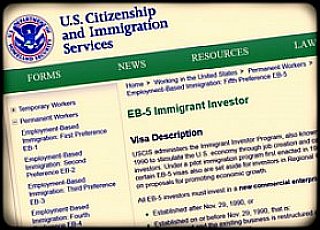
The vast majority of civil penalties in the immigration business are deportations and other removals of illegal aliens.
But sometimes citizens and green card holders receive civil penalties because of immigration-related violations. (These are all quite different from criminal penalties, as they often the results of plea agreements — and never involve jail time.)
An appropriately stiff civil penalty emerged last week as a byproduct of the massive EB-5 fraud scandal in Vermont involving one of the lesser players in this drama. The EB-5 program provides a family-sized set of immigrant visas for those aliens putting half a million or more in a DHS-approved, but not guaranteed, investment in the United States.
Joel N. Burstein, the former son-in-law of Ariel Quiros, the kingpin in the Vermont ski lodge scheme, was a branch manager at Raymond James & Associates, the brokerage firm that had worked closely with Quiros, placing some of the EB-5 investments in Quiros' margin accounts. The firm itself, which presumably no longer employs Burstein, settled with the authorities for a whopping $150 million.
The SEC has just announced that it has obtained a settlement with Burstein in which he agreed to stay out of the brokerage business for 10 full years, a remarkably stiff penalty, or as the SEC release states:
Burstein ... settled, without admitting or denying the findings, to an SEC order that bars him from association with any broker, dealer, investment adviser, municipal securities dealer, transfer agent, or nationally recognized statistical reporting organization, and from participating in an offering of penny stock, with the right to apply for reentry after 10 years.
This was in addition to pledging not to break SEC's anti-fraud provisions and paying a (comparably modest) civil penalty of $80,000.
Comparison to Department of Labor Penalties in the H-2A Program. We recently wrote that the Department of Labor has debarred some growers from that program (another civil penalty) for illegally exploiting foreign farm workers and/or failing to recruit American ones. (Burstein had exploited foreign millionaires.)
Most of the agribusiness outfits that were debarred were put in that category for one or two years; one outlier drew a five-year debarment.
This meant that they could go on farming, as before, with the exception that they could no longer (for a while) make use of the H-2A program; they could continue to grow the crops they liked, but had to use a domestic work force. Or they could grow other, less-labor-intense crops or rent their fields to some other grower. In other words, they could stay in the business that they had known for years.
Burstein faces a different occupational fate. He is not just barred from the EB-5 program, he is denied any work in any field related to his life's work in stock brokerage for 10 years. This is a much stiffer penalty than anything handed out by DoL to the equally erring growers.
Maybe SEC is just a tougher enforcer of the law than DoL, or maybe the lesson is that if you are going to cheat aliens, cheat the ones without power, not the ones worth millions.
In any case, SEC is to be commended for this, and its many other EB-5 enforcement actions.
